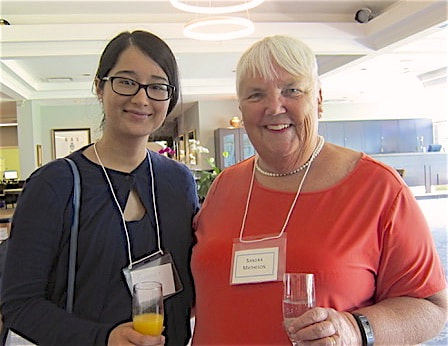|
By: Gurneet Dhami, P.H.Ec. Gurneet Dhami is a Masters candidate completing a dietetic training program and thesis surrounding dietetic diversity and professional culture at Mount Saint Vincent University in Halifax, Nova Scotia. She has previously completed her studies at Ryerson University, where she has graduated from the BASc nutrition and food program (with a minor in sociology) as well as a certificate specializing in food security in her hometown of Toronto. Gurneet hopes to contribute to the dietetics profession through research and opportunities that support diversity, equity and inclusion of individuals from diverse backgrounds. Coming back home for the summer after a memorable time away for my studies makes me reminisce in Dorothy's words from The Wizard of Oz, “there's no place like home." The home shapes our sense of safety and identity as we are introduced to social interaction from caregivers, family and friends. For myself, this is where I learned to garden, cook, manage finances, complete D.I.Y. projects and other household tasks; all of which encompass elements Home Economics.
From a sociological lens, the beginning of Home Economics is both entrepreneurial and feminist because it established a career path for women that challenged their participation in the workforce. This opportunity allowed women to step out of the home as a means of supporting the household, similar to their male counterparts. Not only was this a moment to seize a wage, but it also provided a sense of achievement that continues to excel the importance of the profession. Thanks to the heavy lifting from our predecessors, home economics has created the foundation for dietetics to thrive in today. This past May, I attended the Toronto Nutrition Connection’s (TNC) annual luncheon with an extraordinary bunch of Home Economists. Through mingling and munching, I got to hear their rich stories regarding the profession, projects and so much more! It's not every day you can listen and learn from veterans of the profession but thanks to Ryerson University's Library Archives, the histories have been documented in an accessible public file for easy access. Hearing stories from established professionals such as May Maskow and Sandra Matheson reminded me of how similar we are despite the different stages we may be in our career. For those starting out, hearing stories that connect and give you a sense of what you might be in for is informative and relieving because it’s not just you trying to navigate the twists and turns of the professional path. This year has been very entrepreneurial for myself, as my friends and I have started to come up with business plans for the future without knowing what the future lays ahead for our personal and professional lives. Sandra and I connected on this aspect of home economics and the east coast life with an interesting analogy…we see the joy and hardship of being ‘fishers’ in the ‘ocean of adventure,’ as the ‘catch’ is worth the ‘struggle’ we are willing to take. Sandra shares that “when valuing family is a strong imperative of a home economics professional it feels daunting to also take a new or challenging career path, but for me the entrepreneurial route provided more freedom and reward than I ever would have achieved in a more traditional role. Not that it wasn't stressful or demanding, but the upside was worth the sustained effort required.” Additionally, May shares her thoughts on how “careers in Home Economics could be quite different from each other even when they graduated from the same university” by sharing a brunch story of three ‘foodie’ friends who studied Home Economics at similar points in time and may not have met to prior knowledge. However, as the table was set, connections between them came up in conversation, which goes to show what a small profession it is, and continues to be. I often find myself sparking a discussion with nutrition friends/professionals, which leads us to see a mutual connection of some sort, whether it be university, friends or areas of practice, we are all united through one unique profession. In my community internship, I recall a statement from my public health course to “look back before moving forward” come to mind. Additionally, my preceptor reminds me that individuals’ wellbeing requires knowing how past behaviour/lifestyle habits are developed over a long-term period with personal and social circumstances in mind. Similarly, as a profession, we must look at the highs and lows from the past when thinking of our future vision to grow and flourish. Dr. Jennifer Brady is among the ‘movers and shakers’ revisiting the history of home economics through her research at Mount Saint Vincent University. When asked about her view on the future of home economics for shaping the future of dietetics, Jennifer states: “I think the main thing is to reconnect with the social justice roots of the profession and not just the skills as a solution to food literacy. Home Economics was never just about the skills, but was undergirded by a philosophy and worldview that prioritized social change.” Thinking about this more and more every day has prompted me to continue to challenge the conventions and create a space for opportunity exemplified by home economists. In my personal and professional journey, I hope to unite the profession through inclusive and equitable relations in promoting diversity in dietetics. In dietetics, diversity is framed in mainstream conversation as it relates to food, different professional roles and population served by the dietetic profession. I am grateful to have met and shared critical discussions with the handful of professionals that critique this issue, yet self-reflection on a grander scale remains minimal, as there is lack of attention on professional socialization research surrounding this area of interest. Nonetheless, this is a gap, say it a point of 'discomfort' to challenge and change the profession. Yet, it is points of discomfort like this that have catapulted the home economics profession to challenge and change the perception of women in the workforce. So what better place to start the conversation than with the home economic roots grounding the dietetic profession. Raising consciousness is the first step in beginning dialogue and progressing as a collective, as the saying goes "we are stronger together than apart.” Here’s to the re-shaping and reflecting on what home economics means to you and what you mean to the profession.
6 Comments
7/9/2018 10:13:54 am
Congrats Gurneet on getting this conversations rolling. Am I good to send the link to a number of Home Ec'ers I think would be interested?
Reply
OHEA
7/9/2018 11:02:05 am
Yes, please do share ! :)
Reply
Beverly Musten
7/9/2018 02:34:53 pm
Sandy Matheson forwarded your article to me, Gurneet. It is lovely and very well done. i can hardly wait to see the conversation it generates.
Reply
Gurneet Dhami
7/24/2018 12:19:20 pm
Thank you Beverly for your kind words, definitely more to come as we reflect on our own professional paths !
Reply
Diane O'Shea
7/11/2018 07:42:36 am
A very interesting article! Have you looked at the book: Creating Home Economics Futures? See https://www.amazon.ca/Creating-Home-Economics-Futures-Years/dp/1921513969
Reply
Gurneet Dhami
7/24/2018 12:20:12 pm
Thanks Diane for the book link, I will check it out!
Reply
Your comment will be posted after it is approved.
Leave a Reply. |
The Ontario Home Economics Association, a self-regulating body of professional Home Economists, promotes high professional standards among its members so that they may assist families and individuals to achieve and maintain a desirable quality of life. Categories
All
Archives
April 2024
|
|
Subscribe to our mailing list
|
|
Unsubscribe from our mailing list
|
Copyright © 2023 Ontario Home Economics Association (OHEA). All Rights Reserved.



 RSS Feed
RSS Feed